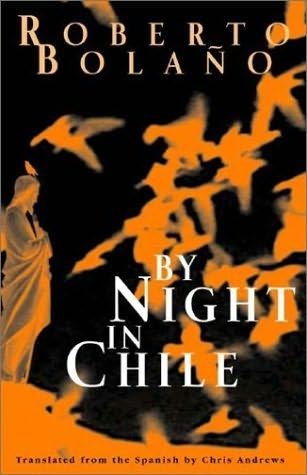.
.
“By Night in Chile” takes the form of a deathbed confession delivered by a Chilean priest, poet and conservative literary critic, Fr. Urrutia. The book’s principal challenge to the uninitiated reader is that it is set in a time, place, culture and political atmosphere unknown to all but a few American readers. An understanding of all the foreign details of the story, and a familiarity with the real life figures who pop up in the priest’s stream of memories (Pablo Neruda, Ernst Junger, General Pinochet, Marta Harnecker) are useful, without doubt. But such foreknowledge is not essential to an immediate enjoyment of the book, so long as you are the kind of reader who takes greater delight in experiencing a literary tour de force that draws you toward a readily understandable moral, a simple truth.
“By Night in Chile” is a bravura performance by Bolaño in which the author has found a distinct way to enwrap and deliver each recollection, each story within a story, each aside, each shift in time, each gruesome discovery, and each blow to the soul, that passes through the dying priest’s sometimes clear, sometimes feverish, mind. One reviewer cites as a defining characteristic of the book, this constant outpouring of side-stories, little morsels, poetry masked by prose. Some readers may find this “meandering” style off-putting, but others of us appreciate the strategy as Bolaño’s signature mode. For us it is an ever-surprising joy. I think the generative force of Bolaño’s communicative charm is the practice and spirit of an all-night “bull session” conducted in college dorms and in fact wherever the intellectually curious are assembled in strange new quarters for purposes of undergoing mind-altering training. If you are of a mindset or personality that typically avoided invitations to join in such sessions, you should avoid “By Night in Chile.”
According to available biographical details, Bolaño life was bohemian — peripatetic, but immersed in the social lives of other poets, painters, musicians, actors. One imagines him as a great talker and a great listener. In a moment of fantasy — never to be fulfilled, alas — I imagine a chance meeting of Roberto Bolaño and the painter/collagist Robert Rauschenberg. What amazing things would have flowed forth had those two spent an afternoon interviewing each other. In my dream I imagine hidden microphones and cameras capturing the sparkling flow of dialog, an outpouring which turns heavenward after I bring to the gentlemen a bottle of Jack Daniels, for RR, and a drug of his choice, for RB.
Literature has been enriched by the confessional form. Think of Coleridge’s “The Rime of the Ancient Mariner,” Browning’s “My Last Duchess,” Camus’ “The Fall.” The confession is a hospitable device for an author interested in psychological exploration and revelation. A man unspools a story of some evil he witnessed or participated in, a sin that weighs upon him, a sin he now owns up to or, alternatively, seeks to justify. His speech ends with a request, express or implied, for the listener (the reader) to understand, to expiate. And yet, while the framework of “By Night in Chile” borrows from this tradition, the book is frustrating as a confession. Perhaps it is as much of a confession as the present era allows. The state of Fr. Urrutia’s soul at the close of his tale is, at least to me, uncertain. That uncertainty led me to trace my steps back to the beginning of the book, where I found the priest’s opening statement of purpose.
Then I understood this is a deeply religious tale, a profoundly moral story. The dying priest, who hoped he could convince himself he had committed no crimes, is by his own reckoning guilty of sins of omission. It is on page one that he reveals a simple credo. The reader, when first encountering these words, may dismiss them as a bromidic utterance, jejune, self-congratulatory. But when read a second time, after curling back from the novel’s end, the words shine clear:
“One has a moral obligation to take responsibility for one’s actions, and that includes one’s words and silences, yes, one’s silences, because silences rise to heaven too, and God hears them . . . so one must be very careful with one’s silences.”
[Note: A slightly altered version of my review appears on Amazon here. Superior reviews are found here and here.]
.
Tags: By Night in Chile, Camus, Coleridge, confession, Ernst Junger, General Pinochet, Marta Harnecker, My Last Duchess, Pablo Naruda, Rime of the Ancient Mariner, Robert Browning, Robert Rauschenberg, Roberto Bolano, The Fall
